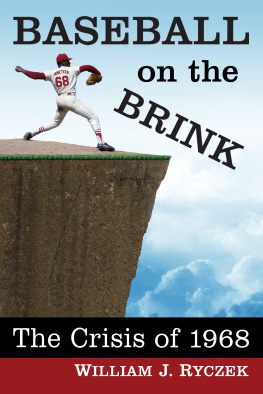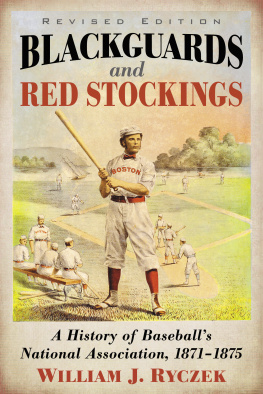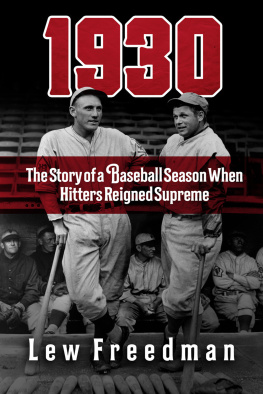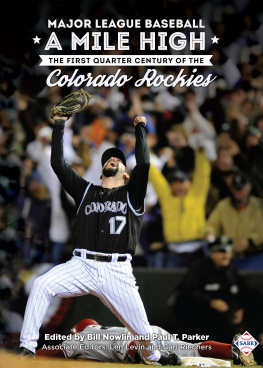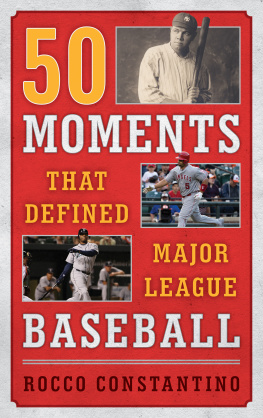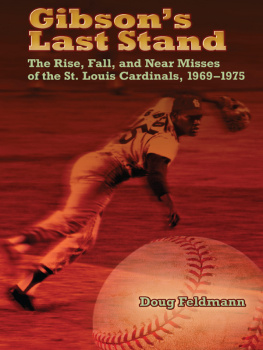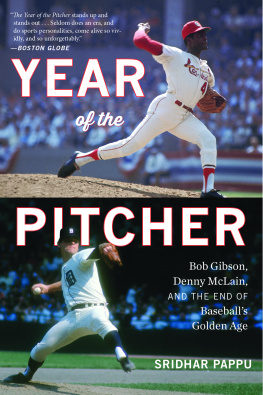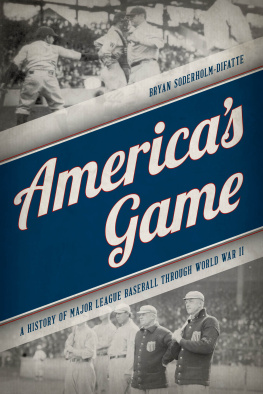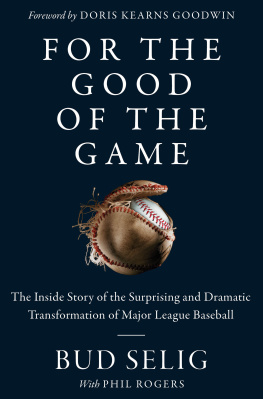
Also by WILLIAM J. RYCZEK
AND FROM MCFARLAND
Blackguards and Red Stockings: A History of Baseballs National Association, 18711875, rev. ed. (2016)
Connecticut Gridiron: Football Minor Leaguers of the 1960s and 1970s (2014)
Crash of the Titans: The Early Years of the New York Jets and the AFL, rev. ed. (2009)
Baseballs First Inning: A History of the National Pastime Through the Civil War (2009)
The Yankees in the Early 1960s (2008)
The Amazin Mets, 19621969 (2008)
When Johnny Came Sliding Home: The PostCivil War Baseball Boom, 18651870 (1998; softcover 2006)
Baseball on the Brink
The Crisis of 1968
WILLIAM J. RYCZEK

McFarland & Company, Inc., Publishers
Jefferson, North Carolina
Photographs are courtesy National Baseball Hall of Fame.
LIBRARY OF CONGRESS CATALOGUING DATA ARE AVAILABLE
BRITISH LIBRARY CATALOGUING DATA ARE AVAILABLE
e-ISBN: 978-1-4766-2803-5
2017 William J. Ryczek. All rights reserved
No part of this book may be reproduced or transmitted in any form or by any means, electronic or mechanical, including photocopying or recording, or by any information storage and retrieval system, without permission in writing from the publisher.
Front cover images 2017 iStock
McFarland & Company, Inc., Publishers
Box 611, Jefferson, North Carolina 28640
www.mcfarlandpub.com
Acknowledgments
Many people were helpful in the preparation of this book, but the first person I would like to thank is historian, writer, and friend Doron (Duke) Goldman, who read the entire manuscript and made many, many improvements to the text. His suggestions included matters of style, phrasing, fact-checking, and overall approach. I am extremely grateful to him for being honest enough to provide criticism where warranted and encouragement when needed.
In previous books, my thanks included a number of librarians, but as the years go on, more of my research is done online. Thanking Hewlett-Packard for my sturdy desktop or Al Gore for inventing the Internet seems too generic and impersonal, so I will pass in that regard. Libraries still play a role in modern research, and I want to thank Jim Gates and the staff at the Giamatti Research Center at the Baseball Hall of Fame, who are always knowledgeable, helpful, and accommodating.
Once again, my friend Fred Dauch read the entire manuscript and offered a number of helpful suggestions.
Last, and certainly not least, I want to thank my wife Susan. Her deep-seated aversion to clutter notwithstanding, she has made minimal comment on the stacks of notebooks piled around my desk chair like sandbags guarding against The Great Flood. Now that this book is finished, another batch of files will move to the basement, and a mild semblance of order will prevail until the next project takes shape. Thank you for your patience.
Introduction
In my Introduction to The Yankees in the Early 1960s, I noted that I had written far more than was possible to include in an intended single volume history of the Yankees and Mets in the 1960s, and that the final product was enough for almost three books. My publisher and I, I wrote, decided to divide the work into one book about the Yankees through 1966 and one on the Mets through 1969, with about 50,000 words left over for an undetermined future project.
This, with further additions and embellishments, is that future project, for during my original research, I became fascinated not just by the story of the Yankees and Mets, but by baseballs crisis of the late 1960s. The game was in decline; many thought it was no longer Americas national pastime, while others believed that by the 1970s baseball would no longer be a major sport. There were numerous problems, and they began at the top. In 1965, in their quest to find a compliant commissioner, the owners had chosen an inept one. While America experienced a decade marked by violence, divisiveness, and rapid change, baseball seemed mired in the 1950s, and William Eckert was not the man to move it forward. He stood by and watched while the American and National Leagues bickered. They all watched as attendance stagnated. They stood by while the labor situation deteriorated and while professional football gained in popularity.
In addition to all of its problems off the field, baseball faced a crisis on the diamond, where pitching had become dominant, resulting in a succession of dull, low-scoring games. This book summarizes the 1968 season, which saw offense become an almost lost art, while pitching marks that had stood for decades were shattered one after the other. The American League had just one .300 hitter, Carl Yastrzemski, who closed with a rush to poke his nose over the magic number after hitting just .270 by midAugust, sparing his league an ignominious fate that had never occurred in the history of major league baseball.
In order to boost attendance, baseball shifted franchises, built attractive new stadiums and, in 1969, added four new teams. The expansion was nearly bungled, as two of the new additions, Seattle and San Diego, drew poorly during their first year while a third, Montreal, was selected without sufficient due diligence and nearly failed to leave the starting gate.
Youth was rebellious during the 1960s, battling with the establishment and protesting the war in Vietnam. Baseball players were young, and while most were not political radicals, large numbers of them were eligible for the military draft. Very few went to Vietnam, but many served in reserve units and had their seasons disrupted by military obligations.
Baseball sought new heroes to replace aging stars like Mickey Mantle and Willie Mays, but it was a non-conformist age, and the sport needed a different kind of hero to catch the fancy of young fans. Jim Boutons ground-breaking 1970 book Ball Four scared the owners, who thought that Bouton had damaged the games image, failing to understand that it appealed to people who had not been fans of their staid old game but might follow one more in step with the times. They didnt realize that neither Bouton nor Marvin Miller, the aggressive head of the Players Association, could destroy the essence of a game that had captured the American imagination for more than a century. They simply made it different and, in many ways, more appealing.
Somehow, baseball survived. The owners rid themselves of their bumbling commissioner and hired Bowie Kuhn, who, despite the criticism he drew during his lengthy tenure, was clearly an improvement. Despite its problems, baseball not only survived; it prospered. Helped along by a couple of rule changes, batters regained their ability to hit and the game on the field became more appealing. In 1969, the New York Mets won the World Series, a seemingly miraculous achievement that enraptured Americas largest city.
Baseball was on the brink in 1968, seemingly ready to be toppled by football, but nearly 50 years later, attendance is at record levels and franchises sell for astronomical amounts. The sport pulled itself, or was pulled in spite of itself, back from the brink, and moved forward into the 1970s. This is the tale of the sorry state of baseball in the late 1960s, its challengesmany self-inflictedthe way the game was played, and how it crawled back from the abyss.
1
Next page
